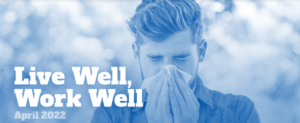
Tips to Avoid Seasonal Allergies
Nip Seasonal Allergies in the Bud
More than 50 million Americans suffer from allergies every year. In particular, springtime allergies are an annual nuisance for many people. As plants begin to bloom and neighbors start to cut their grass more frequently, allergy sufferers nationwide start sniffling and sneezing. What’s more, mold growth blooms both indoors and outdoors, making it almost impossible to escape allergy triggers.
Allergies are the sixth largest cause of chronic illness in the United States, according to the American College of Allergy, Asthma and Immunology.
For some, allergy symptoms may consist of sneezing a couple of times a year. But for others, seasonal allergies can cause congestion, a runny, itchy or stuffy nose, watery eyes, headaches and more for weeks or months at a time.
Fortunately, seasonal allergies only occur during certain parts of the year—usually the spring and summer. There are also natural ways to control your allergy symptoms since they are triggered by common allergens like tree pollen, grass, weeds and mold.
Alleviating Seasonal Allergies
Similar to other types of allergies, seasonal allergies develop when your body’s immune system detects and then overreacts to a foreign substance it thinks is harmful. To reduce your allergies, consider the following strategies:
- Wash your bedding every week in hot water to help keep pollen under control.
- Wash your hair before going to bed since pollen can accumulate in your hair.
- Limit the number of throw rugs to reduce dust and mold in your home.
- Wear an inexpensive painter’s mask and gloves when cleaning, vacuuming or painting to limit skin exposure and dust and chemical inhalation.
- Vacuum twice a week.
- Make sure the rugs you have are washable.
- Change air conditioning and heating air filters often.
Treatment for most allergies is available both over-the-counter and by prescription. If your allergy symptoms are severe or chronic, you may need a series of allergy shots. Contact your doctor or allergist to determine which seasonal allergy treatment option is best for you.
